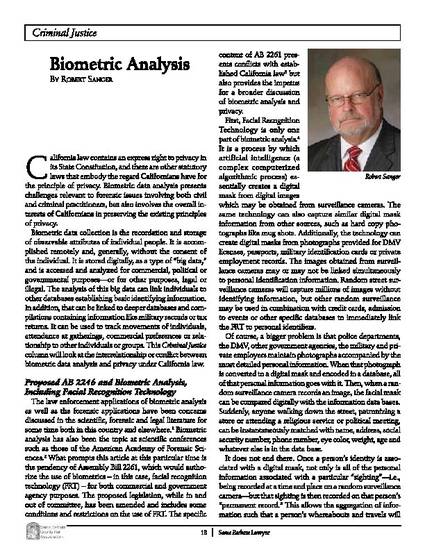
Article
BiometricAnalysis
Santa Barbara Lawyer Magazine
(2020)
Abstract
California law contains an express right to privacy in its State Constitution and there are other statutory laws that embody the regard Californians have for the principle of privacy. Biometric data analysis presents challenges relevant to forensic issues involving both civil and criminal practitioners but, also, involves the overall interests of Californians in preserving the existing principles of privacy.
Biometric data collection is the recordation and storage of observable attributes of individual people. It is accomplished remotely and, generally, without the consent of the individual. It is stored digitally, as a type of “big data,” and is accessed and analyzed for commercial, political or governmental purposes – or for other purposes, legal or illegal. The analysis of this big data can link individuals to other data bases establishing basic identifying information. In addition, that can be linked to deeper data bases and compilations containing information like military records or tax returns. It can be used to track movements of individuals, attendance at gatherings, commercial preferences or relationship to other individuals or groups. This Criminal Justice column will look at the interrelationship or conflict between biometric data analysis and privacy under California law.
Keywords
- constitutional law,
- privacy,
- biometric analysis,
- facial recognition,
- big data,
- criminal law,
- surveillance,
- data collection,
- racial discrimination,
- profiling,
- electronic profiling
Disciplines
Publication Date
July, 2020
Citation Information
Robert M. Sanger. "BiometricAnalysis" Santa Barbara Lawyer Magazine Iss. July 2020 (2020) p. 18 - 23 Available at: http://works.bepress.com/robert_sanger/50/
Creative Commons license

This work is licensed under a Creative Commons CC_BY International License.
